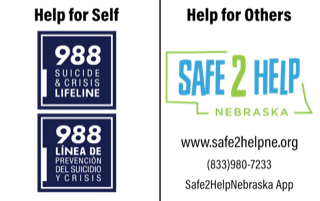Addressing Influenza Outbreaks in Schools
January 04, 2018

ADDRESSING INFLUENZA OUTBREAKS IN SCHOOLS
Experience has demonstrated that schools can amplify transmission of influenza, both within schools and into the wider community. No single measure can stop or limit transmission in schools, which provide multiple opportunities for spread of the virus. Nebraska public health officials recommend the use of a range of measures in the school setting to limit the spread of influenza. Local authorities are in the best position to adapt these measures to their specific circumstances.
These measures can be found in the Guidance for School Administrators to Help Reduce the Spread of Seasonal Influenza in K-12 Schools, and include:
- Teach students, parents, and staff that the single best way to protect against the flu is to get vaccinated each year.
- Consider offering seasonal flu vaccination to students at school.
- Encourage respiratory etiquette among students and staff through education and the provision of supplies.
- Encourage hand hygiene among students and staff through education, scheduled time for handwashing, and the provision of supplies.
- Encourage students and staff to keep their hands away from their nose, mouth, and eyes.
- Encourage routine surface cleaning through education, policy, and the provision of supplies.
- Encourage students and staff to stay home when sick, through education and policy.
- Teach students, parents, and staff the signs and symptoms of flu, emergency warning signs, and high-risk groups.
- Separate sick students and staff from others until they can be picked up to go home.
- Encourage students, parents, and staff to take antiviral drugs if their healthcare provider prescribes them.
- Follow your local flu situation through close communication with state and local health officials.
- Update emergency plans so that they are in place before an outbreak occurs.
Decisions regarding school closure in response to an influenza outbreak are complex. NE public health officials cannot provide specific recommendations regarding school closure that apply to all settings. There is little evidence in the medical literature supporting school closure as a disease prevention measure that reduces influenza transmission in the school and the wider community. Many schools use school closure as a reactive measure. Suspending classes because high levels of absenteeism among students and staff make it impractical to continue classes when absenteeism is of such a degree that material will need to be re-taught once ill students return.
Policies for school closure need to include measures that limit contact among students when not in school. If students congregate in settings other than school, they are likely to continue spread of the virus. The benefits of school closure could be greatly reduced, if not negated. In addition, school authorities weighing the decision to temporarily close a school during an influenza outbreak need to consider economic and social costs, including the need for working parents or guardians to stay home or to place their children in daycare. Social welfare issues must also be considered. Children’s health and well-being can be compromised if highly beneficial school-based social programs, such as the provision of meals, are interrupted or if young children are left at home without supervision.

School Absences Flyer Everyday Preventive Actions











